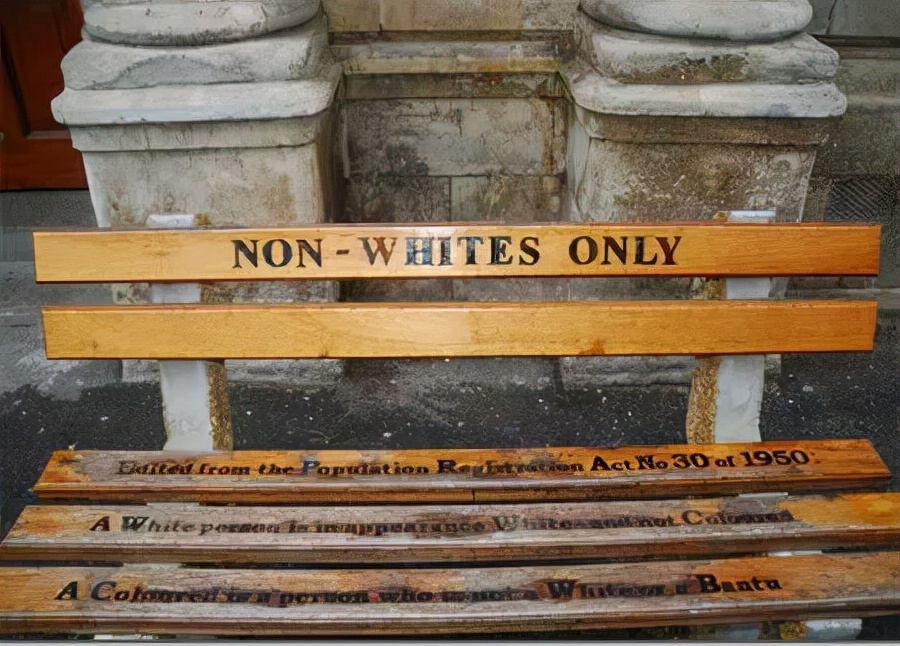南非白人贫民窟:活在社会最底层,靠黑人施舍度日
文章来源: 世界华人周刊
10/14/2021
你一定想不到,那些住在贫民窟、受到肤色歧视的也可能是白种人。
据报道,在当地时间10月3日,美国警察暴力执法案中被害黑人乔治·弗洛伊德的雕像遭到破坏,被白人至上主义者泼上了银色油漆。
实际上,这不是弗洛伊德纪念雕像第一次遭到破坏。早在今年的6月份雕像就被人涂过黑色油漆,并被标上“白人至上主义”组织的标志。
一提起黑人与白人,历史上那些关于奴役与歧视的场景就一一的浮现出来。尽管自美国宣布废除奴隶制以来已经过去了150多年的时间,可根深蒂固的种族思想依旧深刻地影响着在美非洲裔的社会地位。
人人生而平等的口号喊了这么多年,依然有超过半数美国人认为,“种族平等在美国是一个遥不可及的梦想”。
不过很多人都想象不到,有这么一个神奇的非洲国家,完全将黑人与白人之间的地位逆转了,在这里,白人住在贫民窟里备受歧视,黑人则主宰着这里的一切。
01、
这个“神奇”的国家就是曾经被誉为非洲唯一发达国家的南非。
这个曾经为了追求平等、自由,战胜了种族隔离制度的地方,还被称为反黑人歧视的典范。
南非有个著名的白人贫民窟,里面住着数以万计荷兰血统的白人。每个人每月仅靠着政府的低保,大约28.99镑(约260人民币)赖以生存。
放眼望去,破旧的汽车停在一排排破败不堪的老屋前,院子里的孩子衣不蔽体,浑身脏兮兮地在烈日下奔跑;道路上尘土飞扬,垃圾遍地;屋外臭水沟环绕,蚊虫肆虐。
这里没有水电,人身安全得不到保障,每天能够填饱肚子是每个家庭急需解决的难题。
因为当地出台的促进黑人就业政策,即使是没受过教育的黑人也能在当地找到不错的工作,但是白人基本上无法找到工作,因为雇主们拒绝雇佣他们。
他们甚至没有资格生病,因为当地的医院会拒绝为“低等”的白人进行诊治。
国内有一档户外真人秀节目《侣行》,曾经实地探访过这个白人贫民窟。当嘉宾挤在狭小的房间内询问所在家庭的收入来源时,女主人犹豫了一下,介绍起了自己做的项链、手镯等手工艺品,这些都是用来卖给村里人的。
“这里很多白人都很懒散,他们不愿意找工作,也找不到工作。但我还有行动能力,我不愿意靠政府的救济。”
另外一个家庭,怀孕的准妈妈正忙着准备晚餐,已经变形的锅中煮着类似面条的食物。
“我喜欢这个地方,但是我不愿意一辈子呆在这里,我和丈夫都来自一个良好的家庭,我们都有文化,我不希望我的孩子出生在这个区域。”
从节目中可以看出,生活在贫民窟的白人们有自己的理想,想要为家庭创造出更好的环境,想要靠自己的能力改变现状,但是国家却不愿意给他们任何机会。
你一定很难相信,这些往日趾高气昂的白人们会对着镜头自嘲是社会的弃儿。
当全世界的黑人还在为了自由平等不断抗争时,南非的白人却在黑人的统治下被歧视和压迫。
为什么南非这个英勇的反歧视典范国家会转向歧视他人?南非的白人又为什么会沦落到如此地步?
02、
故事要从20世纪南非实行种族隔离制度开始说起,因为该制度在历史上影响巨大,英语中还专门用一个词“apartheid”来特指南非的种族隔离。
当时非洲大陆处于被西方不断入侵和殖民的情况下,而地理位置优越的南非,自然也成为了侵略者眼中的香饽饽,不久南非就沦为了英国和荷兰的殖民地。在白色人种掌握着最高权力的情况下,南非开始实行种族隔离制度。
在这种制度之下,白种人主导着国家的政治和经济大权,黑人只能作为最底层,充当廉价的劳动力。
除此之外,白人和黑人的住所也划分成了两个不同的片区,全国80%的土地归白人所有,黑人被迫居住在隔离区域,使用单独的公共设施,医院、商场、学校甚至公园的凳子都要按照肤色严格区分。

政府禁止白人与其他种族的人通婚,同时明令禁止白人与黑人之间发生性关系。曾经在南非流传过这么一个故事,一个白人老头拥有一名黑人女友,他们手拉手走在街上时,竟然被逮捕了,理由是违反了种族隔离制度的条规。
尽管在南非国内外一直持续进行着反种族隔离运动,但这个政策依然持续了50余年之久。在这期间,黑人种族饱受种族歧视、压迫与不公。
随着黑人不满情绪日益高涨,反种族隔离人士越来越壮大,纳尔逊·罗利赫拉赫拉·曼德拉便是其中重要的积极分子之一,同时非洲国民大会的武装组织民族之矛的领袖。
由于无休止的抗议和镇压活动,南非的经济发展进入了长期衰败的阶段,国际社会开始关注到南非的混乱情况。
1973年,联合国大会谴责了南非的种族隔离政策;
1976年,联合国安理会投票通过了对南非的武器禁运;
1985年,英国和美国对南非进行了经济制裁;
迫于来自国内与国际的双重压力,南非白人政府也认清形势,逐渐开始妥协,于1992年举行了废除种族隔离制度的公投,赞成率达到了69%。
1994年,南非第一次举行了无肤色公开选举,毫无疑问,南非历史上首位黑人总统曼德拉上台,标志着种族隔离制度彻底结束,南非黑人终于挺起了脊梁。
曼德拉上台后,第一件事就是将各种政策偏向黑人,大批黑人开始涌入城市地区,各行各业也以无条件雇佣黑人为第一原则,而那些没有太多技能和工作能力的白人,就只能被社会所淘汰,最终还不起房贷,流离失所,成为贫民窟的一员。
可悲的是,这个曾经为了追求平等、自由,战胜了种族隔离制度的反黑人歧视的国家,现在又陷入了歧视白人的怪圈。
03、
黑人统治下的南非虽然恢复了应有的地位,但全国人民却沉浸在权力失而复得的喜悦中无暇他顾。
那些因为政策优势被优先雇佣的当地黑人,甚至还没有学会使用电脑就走上了职业生涯,政府内的一些岗位人员,没来得及接受一直以来缺失的教育,就学会了“指点江山”,这让南非的官场滋生了大量的贪污腐败事件。
黑人总统上台后,南非的白人们虽然有着远超于黑人的能力和教育水平,却因为地位急转直下,没有任何的话语权,被抛弃于社会边缘。
完全逆转的种族问题,导致白人企业家陆续出逃,国家的制造业水平也随之下滑。因为教育始终无法跟上,黑人工作素质普遍较低,大量本土公司在面对外来企业竞争的时候不堪一击,最终走上绝路。
另一方面,由于长期以来的历史原因,南非黑人与白人的贫富差距比例非常大,这使得南非的治安形势一直相当严峻,绑架、抢劫、枪击、敲诈勒索等恶性案件层出不穷,一度被视为犯罪率最高的国家之一,即使是曼德拉政府上台后这种情况也未有改善。
最重要的是,由于受到国际社会的经济制裁,加上周边邻国都属于经济欠发达国家,还处于战乱和疾病肆虐的状态,根本无法与南非进行经济往来,最终导致国民经济以肉眼可见的速度衰退。
种族歧视的现象很难消除,因为它会受到很多因素的影响。一些旨在用于消除种族歧视的政策大量实施的时候,其实也会催生出另外一种逆向歧视。
这个世界本来不应该是非黑即白的,人也不一定是非善即恶的。
想要消除种族歧视,正确的态度是要努力地减弱种族歧视在社会中的负面影响,而不是从一种歧视转变成另一种歧视。
人生来平等,不应该只是一句口号。
Race and capitalism: no easy answers, but posturing will get South Africa nowhere
By Roger Southall | Professor of Sociology, University of the Witwatersrand
10/14/2021
It is likely that historians will conclude that there was no one reason why the recent riots and looting of supermarkets, shops and warehouses in KwaZulu-Natal and Gauteng, South Africa’s two most economically important provinces, caught up so many generally law-abiding citizens in their slipstream. There were seemingly numerous dynamics at play, from the sheer poverty of numerous black citizens through to the manipulations of social media by supporters of former President Jacob Zuma, angered by his arrest.
However, one explanation which has been touted in various quarters has been that the upheaval was the outcome of ‘the racial capitalism’ to which South Africa has been subjected over the centuries. Such an explanation hearkens back to the racialised policies of the past, and how they twinned the political ideologies of segregation and apartheid promoted by South Africa’s white governments before democratic transition in 1994.
This view holds that the inequalities of the present, which continue to have a strong racial dimension, along with the brutal treatment handed out to poor black people – for instance, by the police at Marikana in 2012, in the North West Province, when police shot dead 35 protesting miners – are a product of the history of racial capitalism in South Africa.
It is difficult to disagree with the major thrust of much of the analysis which is put forward in this vein. It is widely accepted that the democratic transition in 1994 was the result of an ‘elite pact’ which transformed the country’s politics but did little to undermine the foundations of white economic power.
It is continuity as much as change which characterises the post-apartheid political economy. Nonetheless, South Africans need to take care in ascribing all the present crises to ‘racial capitalism’. Blaming racial capitalism for all the country’s ills can easily become a way of deflecting responsibility away from the country’s present politicians – and from South Africans themselves.
The past as present
Colonial conquest happened in tandem with the development of capitalism. Both projects requiring non-white people, notably Africans, to become instruments for the purposes of others. Africans were stripped of their land and their possessions and became the tools of their oppressors. This process was not stopped by the arrival of democracy.
When miners of Lonmin in Marikana, in the platinum-rich North West Province demanded a reasonable increase in their wages, the state colluded with foreign capital to crush their dissent. Inequality nurtures this objectification of humans, leading to greater exploitation of the poor, who are overwhelmingly black.
The problem with the solution that is often provided – that the entire system of ‘racial capitalism’ should be overthrown – is that it is so remarkably bland. So, it is worth attempting to deconstruct it.
So, what is to be done?
Is the implication that racism and capitalism are inseparable? If that is so, is the further implication that capitalism itself should be overthrown? Which is perhaps a very nice idea, but first, is this practical and likely? Who is to do the overthrowing? At what human and other cost (as its unlikely that capital and the state would give up without a fight)? And what would be put in capitalism’s place? Is this to be a new socialist order, and if so, will South Africa be following historical examples (which, on the whole, have not been very successful) or will it be charting its own way forward?
Or is the implication that capitalism can be deracialised? This is very much what, in theory, the African National Congress (ANC), which has governed the country since 1994, has set out to do through equity employment and black economic empowerment legislation. Although the corporate profile, in terms of ownership and management personnel has registered not insignificant change, most would agree that the achievements of ANC policies have been remarkably modest.
However, it remains a matter of considerable debate whether this is because of corporate resistance, social factors (such as inadequate supplies of suitably trained black personnel) and or the incompetence of the state.
Leaving aside the entire question of whether a de-racialised capitalism would be less exploitative than a racialised one, and whether it would be less patriarchal, the more fundamental issue is how can South Africa achieve it if current strategies – which most would agree are well intentioned – are proving inadequate in realising their goals.
Should equity employment and black economic empowerment be ratcheted up, when the prevailing cry from the business establishment is that more regulation serves as major barrier to the inflow of much needed foreign investment? Will this increase or deter a rise in much needed employment? Or is it that current strategies should be re-engineered?
Often left out of such analysis is the question of what sort of state will be required to bring about the transformation to the more humane society South Africans are looking for. Present disillusion with the post-1994 order highlights the limits of South Africa’s democracy, and the ways in which ANC dominance has eroded it.
Much attention lately has been focused on the ANC’s strategy of deployment, how this has led to the substitution of political loyalty to the party for the capacity to do the job, how deployment has led to corruption, how it has destroyed state-owned corporations , how it has undermined the efficiency of government, and how it has collapsed local government.
The answer that is usually given is that it is necessary to undo the merger of party and state and entrench the independence of the state to allow for expertise to flourish, and to ensure the rise of meritocracy. But then we are left with the conundrum whether the ANC is capable of bringing such a transformation about, or whether the ANC itself needs to be removed from power.
That, in turn, demands not only that it must lose an election, but that it will gracefully concede its loss if it did so. Perhaps both dimensions of that last sentence are unlikely.
No easy answers
So where does all this lead South Africa? Quite frankly, I don’t know. But I do know that the answers to South Africa’s numerous problems are far from easy. This does not mean that South Africans cannot work their way to finding the solutions, and unless they are just going to give up, they have to believe that they can. But, it is going to be extremely hard work. South Africans will have to talk to, listen to, and bargain hard with each other to find their way.
But one thing South Africans must draw from such complexity is that any realistic and workable answers will not be arrived at by posturing. Alas, there are no easy answers.


